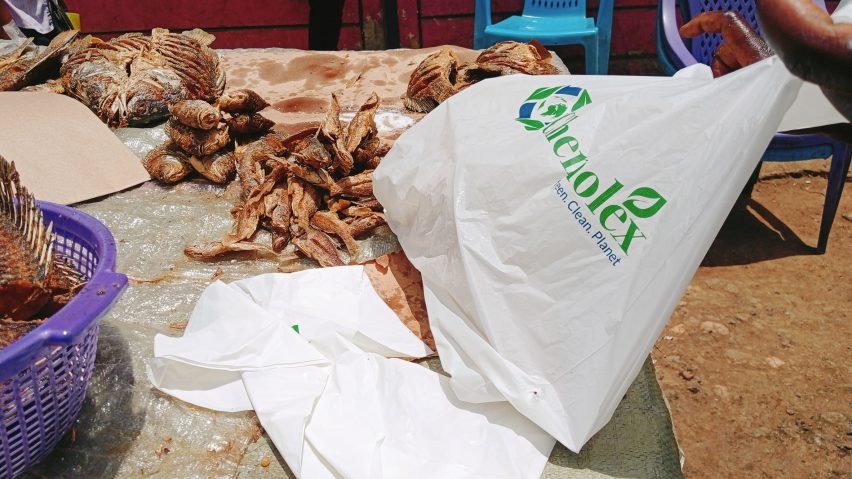The Canadian government and social enterprise Challenge Works have announced the winners of their Afri-Plastics Challenge – an accelerator for companies across sub-Saharan Africa that are working to end plastic pollution.
The competition's £4.1 million prize fund was divided among nine winning projects, including a reusable diaper subscription from Rwanda and a Kenyan company making washing-up brushes from discarded coconut fibres.
"Eleven million tonnes of plastic waste enter the ocean each year," said Challenge Works' managing director Tris Dyson. "The winners of the Afri-Plastics Challenge are putting African innovation at the heart of solving this global problem."
Launched in July 2021, the accelerator program received more than a thousand entries that were whittled down to a shortlist of the 40 most promising projects, 60 per cent of which were female-led.
The finalists, alongside the 31 other shortlisted projects, had already received £4.8 million worth of seed funding, grants and support throughout the duration of the competition. Since its launch they have reported a 113 per cent increase in the amount of plastic being collected and processed every month.
"We are awarding more than £4 million to businesses that are already doubling recycling rates thanks to the Afri-Plastics Challenge while providing new sources of income for families [and] pioneering companies," Dyson said.
The biggest cut of the prize fund at £1 million went to Green Industry Plast – an initiative setting up plastic donation bins across Togo and training young drop-outs and women in sorting and recycling the waste to make building materials.
Once the plastic is melted, it is mixed with sand and cast into moulds to create bricks and paving stones for the local community.
"The Ecopave concept is an innovation designed to win over the minds of everyday people and persuade them to make more sustainable choices in the materials they use and the way they dispose of plastic," said the company's CEO Gado Bemah.
Another £750,000 was awarded to Kenyan company Chemolex, which has developed a bioplastic made from invasive water hyacinths that are blanketing Lake Victoria.
The Biopactic material provides an alternative to fossil-based plastics while creating an economic incentive for removing the invasive species wreaking havoc on the local ecosystem.
Fellow Kenyan company EcoCoCo, which took home £250,000, took a different approach and instead focused on finding a plastic-free replacement for traditional scrubbing brushes and scouring pads.
Competitively priced and biodegradable, the resulting pieces are made using waste coconut husks for bristles and handles made using wood offcuts from local timber yards and carpenters.
"Plastic dish scrubs and sponges are commonplace in homes in Africa and are some of the most wasteful products in our kitchens," explained project lead Ingabo Schneidder.
"When in use, they shed tiny fibres, a type of microplastic, which can't be filtered out by water treatment plants and end up in the water system. And then there's the waste factor because they are replaced often and are not recyclable."
Another winning project was Toto Safi from Rwanda, an affordable women-run subscription service that delivers and cleans reusable nappies.
The aim is to cut down on the 7,000 disposable diapers an average baby needs before they are potty trained and ultimately save not just waste but also cost.
"Many mothers in Rwanda just don't have the money to keep up with the number of disposable diapers they need, forcing them to cut back on basic essentials," CEO Faith Wacera explained. "For some mothers, it can mean the choice between diapers and food."
Other winning projects include Mega Gas, Ukwenza VR and Baus Taka Enterprise from Kenya, Chanja Datti from Nigeria and Catharina Natang from Cameroon.
Plastic pollution is at the top of the global agenda at the moment as the second round of negotiations for the UN's Global Plastics Treaty took place in Paris last week.
Delegates from 180 nations and various other stakeholders were involved in the discussions to determine what the first-ever international treaty to regulate plastic production and pollution should include.
But ahead of the negotiations, a number of NGOs and scientists accused the UN Environment Programme (UNEP) of excluding communities and waste pickers from developing countries, which are most affected by plastic pollution.
Meanwhile, Greenpeace lobbied for the treaty to focus on capping and phasing down plastic production instead of treating recycling as a silver bullet solution, in a report outlining how recycled polymers often contain more toxic chemicals than virgin plastic.

